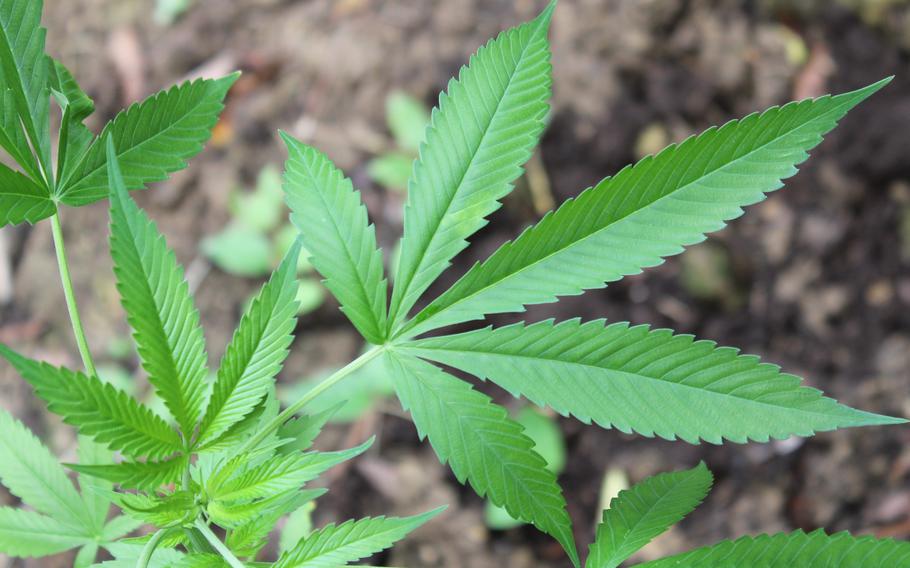
Germany legalized cannabis use April 1, 2024, opening doors for regulated clubs and individuals to grow and consume small amounts. U.S. service members and their families in Germany remain under strict DOD policies prohibiting involvement with the drugs, though, officials say. (Will Cox/Army National Guard)
U.S. service members, Defense Department workers and family members stationed in Germany remain barred from using marijuana despite Germany’s new law legalizing the drug, the U.S. Army in Europe said in a statement.
Marijuana enthusiasts across the nation Monday celebrated the new law, which legalizes cultivation, possession and consumption.
However, strict regulations remain in place under the Uniform Code of Military Justice for service members, while DOD and Europe-based military regulations forbid its use for contractors, Defense Department civilians and others in Germany under the Status of Forces Agreement.
The regulations forbid “using, buying, selling, possessing, delivering, advertising, having custody of, manufacturing, storing, packaging, testing, or concealing any controlled substance,” U.S. Army Europe and Africa said Friday in response to a query.
Even with Germany’s doors to marijuana consumption opening, military housing and private off-base residences of U.S. service members stand as islands of prohibition.
It remains unclear how regulations barring marijuana possession and use would be enforced off-base. But the consequences of running afoul of drug regulations are potentially severe, even for family members. They include the loss of command sponsorship and early repatriation to the United States without their sponsor, USAREUR-AF said.
The Army in Europe’s regulation also explicitly prohibits personnel from knowingly introducing drugs or related paraphernalia into a military area or facility.
The finer points regarding marijuana use by local employees in Germany and additional guidance for U.S. personnel are “still being negotiated and will be addressed in the future,” the Army statement said.
The Drug-free Workplace Act of 1988 directs that any organization that receives a federal contract of $100,000 or more or receives a federal grant of any size must establish a drug-free workplace policy, the U.S. Army in Europe said.
For German service members, similar limitations continue to apply. Despite the legalization nationwide, marijuana is still off limits for soldiers under military law, according to the German service members association DVBW.
More than 4.5 million adults in the country consumed marijuana at least once within a period of 12 months despite its previously outlawed status, according to a 2021 survey by Germany’s health ministry.
The Association of German Criminal Police Officers has supported ending the ban on marijuana since 2018 and has repeatedly called for the decriminalization of all use of the drug.
The new liberal approach includes an amnesty program for previous cannabis-related offenses, signaling a significant shift in the country’s drug policy.
Marijuana was most commonly used in the 18- to 24-year-old age group. Under the new law, the purchase, possession and cultivation of marijuana by minors remains prohibited, according to a government statement.
Laws regarding driving under the influence of marijuana will be adapted similarly to those related to alcohol and driving motor vehicles on public roads under the influence of cannabis remains prohibited, Westpfalz Police said.
The limit values for THC in the blood are being examined and determined by the German transportation ministry.
Under the newly enacted legislation, German residents are allowed to carry up to 25 grams, or about an ounce, of marijuana and cultivate up to three plants for personal use.
German residents also can store up to 50 grams, or 1.7 ounces, of homemade marijuana under their own roofs. Privately cultivated marijuana may not be sold or passed on to third parties.
Additionally, adults over the age of 18 can join “cannabis clubs” starting in July, a move aimed at regulating consumption and cultivation within a controlled environment, according to Germany’s health ministry. These private associations can only share their crop with members under non-commercial distribution agreements.
The law also allows for regional pilot projects with commercial supply chains, which is under review by the European Commission, according to a government website on the changes. Once approved, commercial retail dispensaries and coffee shops based on the Dutch model may be in Germany’s future.
In the U.S., 24 states have legalized recreational use of marijuana, including states with a significant military presence, such as California and Virginia.
However, the drug remains illegal under federal law.